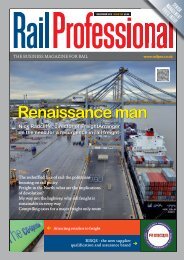View as PDF - Rail Professional
View as PDF - Rail Professional
View as PDF - Rail Professional
You also want an ePaper? Increase the reach of your titles
YUMPU automatically turns print PDFs into web optimized ePapers that Google loves.
Training<br />
Pioneering<br />
partnership<br />
<strong>Rail</strong> <strong>Professional</strong> looks at an initiative to support staff involved in railway<br />
suicides, which may even help to save lives<br />
There are on average about 200<br />
suicides a year, impacting on a<br />
wide range of people directly<br />
and indirectly, and on the rail<br />
industry <strong>as</strong> a whole. A programme led<br />
by Network <strong>Rail</strong> and the Samaritans<br />
h<strong>as</strong> been working to reduce suicide<br />
on the railways since 2010. Innovative<br />
and award-winning, the partnership is<br />
delivering the first national, co-ordinated<br />
suicide reduction programme on the<br />
railways. Prevention me<strong>as</strong>ures include<br />
training frontline rail staff, running<br />
campaigns to encourage people to get<br />
help and working in partnership to offer<br />
support to people who may be at risk<br />
of suicide.<br />
More than 30 interventions have<br />
been reported to the project team at<br />
Samaritans, but it is thought that there<br />
are many more. Sophie Lapham, strategic<br />
programme manager at Samaritans,<br />
says, ‘It is really important that we<br />
get to hear about these interventions.<br />
Firstly, so that the member of staff can<br />
be recognised for his or her courageous<br />
action, secondly to help us to evaluate<br />
the effectiveness of the training, and<br />
thirdly for suicide prevention, so that<br />
the various agencies are aware of the<br />
individual and the location, and can<br />
check if anything further needs to<br />
be done.’<br />
Jill MacKeith, research manager at<br />
RSSB adds, ‘A study showed that over<br />
a 10 year period following a suicide<br />
attempt, only 10 per cent of people went<br />
on to complete suicide. This means that<br />
in breaking someone’s suicidal plan, rail<br />
staff are not just preventing a suicide on<br />
that particular day, but may succeed in<br />
preventing the person from taking their<br />
life at all.’<br />
Supporting rail staff after fatalities<br />
The focus of the programme is on<br />
me<strong>as</strong>ures to prevent suicide; however,<br />
it h<strong>as</strong> quickly become apparent that<br />
the partnership needed to do more<br />
to support staff who are affected by<br />
suicides and other fatalities. A one-day<br />
course called Trauma Support Training<br />
w<strong>as</strong> developed with Aslef, E<strong>as</strong>t Midlands<br />
Trains, Network <strong>Rail</strong> and Samaritans<br />
and it aims to equip managers and union<br />
representatives with an understanding<br />
of trauma and how it affects people, and<br />
to give them skills to provide effective<br />
support. With exercises b<strong>as</strong>ed on the<br />
real-life experiences of a train driver, the<br />
course is also relevant to managers of<br />
other staff who are exposed to traumatic<br />
experiences, such <strong>as</strong> station staff and<br />
operations staff.<br />
Darren Ward, head of ops strategy<br />
and implementation at E<strong>as</strong>t Midlands<br />
Trains, says: ‘Before this programme, the<br />
support and advice provided to drivers<br />
after they were involved in fatalities<br />
could vary m<strong>as</strong>sively, even within the<br />
same Toc. Samaritans h<strong>as</strong> worked with<br />
the rail industry to develop an accredited<br />
training course that helps guide those<br />
that manage the welfare of drivers on an<br />
individual level.’<br />
Another way of helping drivers h<strong>as</strong><br />
been to develop a booklet, Journey to<br />
Recovery which explains what happens<br />
when there is a fatality, what reactions<br />
a driver might experience and why, and<br />
how to get help. The guidance h<strong>as</strong> had<br />
input from train operators and Aslef and<br />
will be distributed to all drivers via their<br />
managers.<br />
Chris Gibb, chief operating officer<br />
at Virgin Trains, says: ‘I support fully<br />
the industry drive with the Samaritans<br />
to focus on prevention of suicides on<br />
the railway, and not to accept them <strong>as</strong><br />
inevitable. Nevertheless, when they<br />
do happen our focus turns to looking<br />
after our customers and staff and, in<br />
particular, the driver. Every driver is an<br />
individual with different needs, which<br />
we strive to recognise and respond to,<br />
sometimes long after the event. This<br />
booklet aims to help drivers recover from<br />
traumatic events by making them aware<br />
of the support available to them.’<br />
For information about training courses<br />
or any other <strong>as</strong>pect of the suicide<br />
reduction programme, ple<strong>as</strong>e contact<br />
railcompanies@samaritans.org<br />
september 2012 Page 9

















